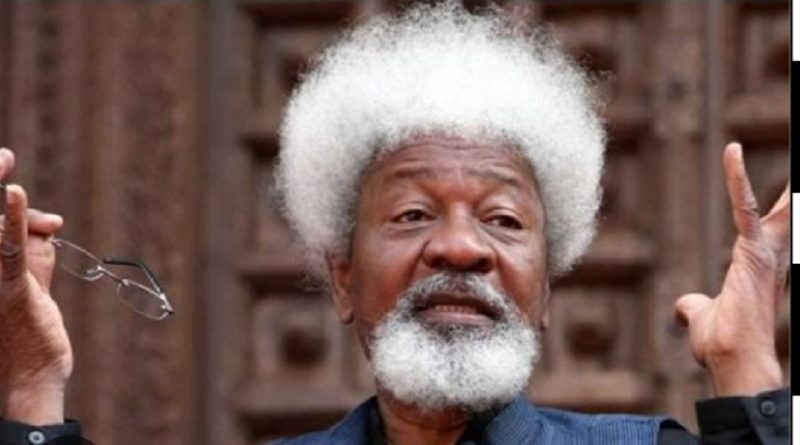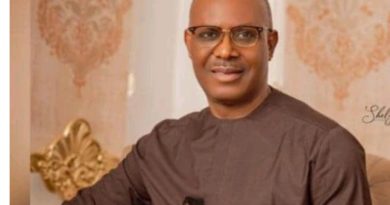THE SOYINKA PARADOX: Unwavering Ideals vs Political Pragmatism
By Dr Iyke Ezeugo
Wole Soyinka’s 90th birthday was marked by eulogies, pomp, and fanfare, culminating in the renaming of the National Theatre in his honor. This recognition of Nigeria’s literary giant and Nobel laureate is well deserved. Yet, his unequivocal support for Tinubu’s presidential bid, his silence on Tinubu’s controversial past, and his acceptance of the National Theatre’s renaming have sparked a national conversation blending celebration with unease.
While the initial celebratory clinking of glasses reverberated on social media, the applause of self-serving elitist journalists clashed with the cries of the masses, questioning Soyinka’s integrity. “Tufiakwa!” they exclaim. Was Soyinka’s endorsement part of a broader deal involving Tinubu’s controversial ’emilokan’ mantra and the widespread electoral malpractice that marred the 2023 elections? Did Soyinka remain silent on the judiciary’s controversial upholding of Tinubu’s election, a decision many saw as judicial rubber-stamping rather than justice? His acceptance of the National Theatre’s renaming adds fuel to the fire: was this merely an impulsive birthday honor or something more insidious?
The masses, whose causes Soyinka has long championed, now question if their hero has been silenced by this honor. Some argue that a lifetime of good deeds shouldn’t be overshadowed by a few errors. However, others draw comparisons to Chinua Achebe, who famously rejected national honors to protest a failing government. Achebe’s unwavering stance reminds us that true critics live above recognition and reward. The renaming of the National Theatre, while seemingly an honor, unsettles ordinary Nigerians who fear this once vibrant critical voice may now be subdued.
A Labyrinth of Compromise
The situation evokes the image of a mythical Minotaur, trapped in a labyrinth. With Tinubu in the presidential ring, Soyinka navigates a complex maze of political compromise, where the lines between integrity and pragmatism blur. Tinubu, a master political player, knows how to manipulate resources and people. His swift move to rename the National Theatre after Soyinka raises a crucial question: is this a genuine act of respect or a political maneuver to silence a waiting critic?
An Enigma Unraveled: Redemption or Resignation?
Soyinka’s story unfolds like a dramatic satire, leaving more questions than answers. Has ‘the man’ truly ‘died’ in him, or is he waiting for a dramatic return? As Nigeria grapples with its own complex dance between democracy and corruption, Soyinka’s past pronouncements haunt the present:
1. On Sani Abacha’s Regime:
– “Nigeria is on a downward spiral into the dark abyss of totalitarianism.”
– Source: [Guardian, 1996].
2. On Olusegun Obasanjo’s Administration:
– “The nation is under siege from a clique that is holding power to ransom.”
– Source: [BBC News, 2004].
3. On Goodluck Jonathan’s Presidency:
– “President Goodluck Jonathan was a failure and embarrassment to the country.”
– Source: [Punch Newspapers, 2013].
4. On Muhammadu Buhari’s Administration:
– “President Buhari has fallen below the standards we expected.”
– Source: [Premium Times, 2016].
5. General Critique of Nigerian Leadership:
– “Our leaders have betrayed the dreams of independence.”
– Source: [Nigerian Tribune, 2010].
6. On Ibrahim Babangida’s Regime:
– “Babangida’s government was an era marked by corruption and deceit.”
– Source: [Vanguard, 2009].
7. On Umaru Musa Yar’Adua’s Administration:
– “Yar’Adua’s administration was an exercise in futility and false promises.”
– Source: [The Nation, 2008].
8. On Corruption in Nigerian Politics:
– “The political arena in Nigeria is a theatre of corruption and incompetence.”
– Source: [This Day Live, 2012].
9. On Election Malpractices:
– “Elections in Nigeria have become a farce, a tragic comedy of manipulation and rigging.”
– Source: [The Guardian Nigeria, 2007].
10. On Ethnic and Religious Divisions:
– “Our leaders exploit ethnic and religious divisions to perpetuate their hold on power.”
– Source: [Daily Trust, 2011].
11. On Military Dictatorship:
– “The military rulers have brought nothing but misery and stagnation to Nigeria.”
– Source: [New York Times, 1995].
12. On Human Rights Violations:
– “Successive governments in Nigeria have shown blatant disregard for human rights and civil liberties.”
– Source: [Amnesty International, 2001].
13. On the Nigerian Judiciary:
– “The judiciary in Nigeria has been compromised and is no longer the last hope of the common man.”
– Source: [The Guardian Nigeria, 2009].
These quotes highlight Soyinka’s staunch critique of various Nigerian administrations and his unwavering commitment to speaking truth to power. Yet, his recent silence and acceptance of Tinubu’s regime in the face of startling controversies present a paradox, leaving many to wonder if the once fiery critic has become a tacit accomplice.
The Conundrum of Legacy
Although there is nothing wrong in that, Soyinka has time and again expressed support for Bola Tinubu through various statements and actions. In December 2023, Soyinka visited Tinubu, presenting a seven-point agenda for Nigeria’s development and addressing him as an “old friend.” Their historical collaboration in the pro-democracy movement against General Sani Abacha’s military regime underscores their shared ‘commitment’ to democratic ideals, and the ‘old-friend’ revelation.
Soyinka has publicly acknowledged Tinubu’s political resilience and ‘past contributions’ to Nigeria’s democracy. Their personal relationship and shared history influence Soyinka’s public stance on Tinubu, raising the question of whether their shared values align with Soyinka’s past ideals.
The Bard’s Dilemma
The story of Soyinka and the National Theatre will long remain a compelling narrative, a rich tapestry woven with threads of idealism, compromise, and the perennial struggle for integrity in the face of political pragmatism. It beckons us to reflect on the broader implications for Nigeria’s future. Will Soyinka’s silence be a temporary interlude, or will he rise again, the fearless bard unafraid to challenge the status quo?
The Crossroads of Legacy
The renaming of the National Theatre after Wole Soyinka symbolizes more than just an honor; it represents a critical juncture in the Nigerian political landscape. It forces a nation to reckon with the complexities of hero worship, the price of compromise, and the enduring power of an individual’s voice. As Soyinka’s story unfolds, it remains to be seen whether he will choose the path of silent acceptance or reclaim his mantle as the indomitable conscience of the nation.
There is nothing personal but to challenge us to hold our heroes and government accountable, to celebrate their achievements without turning a blind eye to their shortcomings in a manner that can be mistaken for approval. In doing so, we honor the true spirit of Wole Soyinka—not just as a literary giant but as a relentless advocate for justice, integrity, and the unwavering pursuit of truth.
Feel free to join Dr. Iyke Ezeugo’s parody in x-raying the fabrics of our society.




